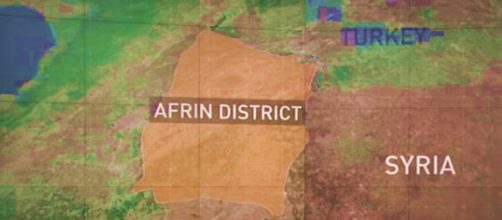U.S. President Donald Trump mentioned Russia as a rival in his State-of-the-Union speech Jan. 30. He also repeatedly mentioned Iran and North Korea unfavorably. Trump did not utter “Turkey,” but you might wonder if a threat the president aimed at North Korea would not fit the Erdogan regime. Televised by Fox News he said, “Past experience has taught us that complacency and concessions only invite aggression and provocation, I will not repeat the mistakes of past administrations that got us into this dangerous position.”
Low and behold, China’s official press agency, suspects Turkey will steer clear of Manbij and U.S.
forces, thus avoiding a confrontation between NATO partners for the time being. Instead, Turk forces are moving east toward Idlib.
New front
Further clouding the picture, Syrian forces targeted a Turkish military convoy in Aleppo province in northern Syria, according to the Syrian Observatory for Human Rights. Turkish military vehicles and accompanied forces to withdrew to the west. Syria, once part of the Ottoman Empire, has declared its right to protect itself after the Turks invaded Afrin.
"Erdogan is killing babies, children, old people"
— Ashraf Sherjan (@ASJBaloch) January 31, 2018
Protesters call on Theresa May & the UK government to do more to defend the people of `#Afrin, Halab, Syria.#StopAfrinGenocide #AfrinUnderAttack #AfrinNotAlone pic.twitter.com/7H59emUOcw
Idlib was named a “de-escalation” zone under a deal brokered by Russia in August.
Al Qaeda controls the province. Turkey has worked with Russia and Iran, staunch supporters of Syrian President Bashar al-Assad, instead of the United States since 2016. America is unwelcome and wants Assad ousted.
Turkey has closed its borders. Pro-Syria forces advance on Islamic terrorists, similar to the siege on Aleppo last year. About 250,000 civilians wonder from place to place seeking shelter, food, and safety from the bombing.
Russia has unofficially extended the Operation Olive Branch. As Turk forces ground to a stalemate in Afrin—Turk or allied groups gain ground in Afrin by day, Kurds reportedly retake it at night—Russian planes hit Kurd held sections of Idlib Jan. 29.
“People are waiting for their turn to die,” a local aid worker in Idlib was quoted in the Washington Post.
“We are very tired.” This is life for Kurds on the expanding western front on the war for survival in Syria.
Peace talks?
Some believe Moscow took the action after opposition representatives refused “invitations” to attend the Russian-sponsored Syrian Congress of National Dialogue in Sochi Jan. 30. Opponents said they saw the “talks” as a one-way affair in which Damascus and Moscow dictated terms to settle Syria’s civil war and attendees could agree or face arrest, according to numerous news reports.
Representatives from France and the United States were invited to attend Sochi as observers but opted to wait for a United Nations’ plan. Neither the Syrian Negotiations Committee nor Syrian Kurds attended, but the Russians sent out more than 1,500 invitations, according to Moscow’s radio station in America—Sputnik. Russia claims 1,511 Syrian tribal and religious leaders, politicians opposition figures and other the participants planned a new constitution for Syria.


